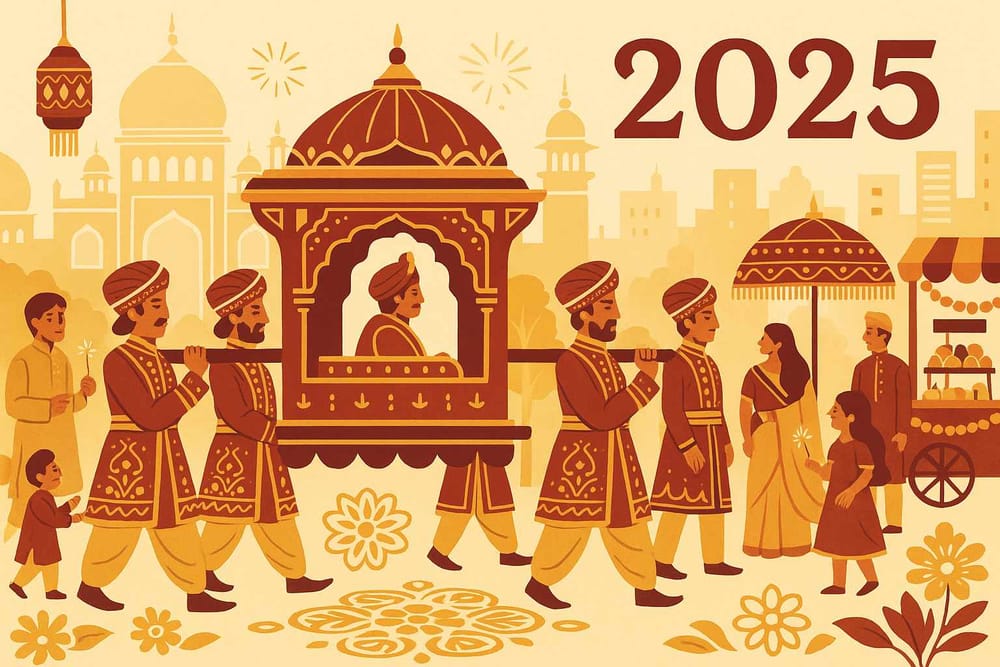
Royal Traditions Shape Local Celebrations: Preserving Heritage in 2025
In 2025, as India gracefully balances tradition with the rhythm of modern life, royal customs remain a vital thread connecting our past to the present. These time-honored traditions deeply influence our local festivals, rituals, and vibrant cultural expressions, offering a profound sense of pride and continuity. For many Indians, celebrating these customs isn't just about remembering history; it's about embracing our identity and strengthening our sense of community in a truly meaningful way.
The Enduring Legacy of Royal Traditions in India
Royal traditions have indelibly shaped India's rich cultural tapestry. Kings were not merely rulers but revered protectors of both governance and heritage, often described as fulfilling their sacred 'Rajdharma.' Think of festivals like the majestic Mysore Dasara—a shining example of how royal patronage elevated local celebrations into grand spectacles. Royal families, as patrons of the arts, nurtured rituals, architecture, and craftsmanship, fostering immense pride within their communities. Palaces and forts weren't just royal residences; they served as vibrant ceremonial centers for festivals. Many customs, deeply rooted in these regal traditions, continue to influence our practices today, a testament to their timeless relevance.
Exploring Royal Traditions and Local Celebrations: Preserving Heritage in 2025
Royal traditions have a fascinating way of weaving themselves into the fabric of local celebrations. Let's delve into how these customs have shaped our festivals, rituals, and cultural expressions, offering a glimpse into their profound significance in preserving our heritage.
- King Charles III's 75th Birthday: While not directly related to India, global royal events often inspire and influence celebrations worldwide. The grand festivities planned for King Charles's birthday could spark renewed interest in traditional celebrations and regal customs.
- Trooping the Colour (June 14, 2025): This spectacular military parade in London, celebrating the Sovereign's official birthday, reminds us of the grandeur and pageantry associated with royal traditions, influencing similar displays in other cultures.
- Highland Games (Scotland, May-September 2025): These vibrant celebrations of Scottish culture, often attended by the Royal Family, emphasize the role of tradition in fostering community pride and identity, similar to how royal traditions shape local festivals in India.
- Western Cape Heritage Day (South Africa, September 24, 2025): This celebration underscores the importance of reflecting on collective memory and cultural heritage, echoing the sentiment behind preserving royal traditions in India. The focus on heritage walks, food festivals, and cultural performances reminds us of similar initiatives in India aimed at preserving local traditions.
These examples, while diverse, share a common thread: the vital role of tradition in shaping cultural identity and fostering a sense of belonging. Just as royal events and local celebrations abroad emphasize preserving heritage, so too do royal traditions in India play a crucial role in enriching our cultural tapestry.
Bhaktilipi.in: Where Tradition Meets Today
At Bhaktilipi.in, we bridge the gap between the timeless wisdom of devotional literature and the realities of today’s world. Our meticulous translations and thoughtful adaptations make ancient stories, hymns, poems, and scriptures accessible to modern readers, all while preserving their spiritual essence. Our mission is to keep tradition alive by making it relevant and relatable for everyone, regardless of their background.
Why Choose Bhaktilipi?
- Preserve Heritage: Delve into a treasure trove of devotional works from across languages and cultures, experiencing the richness of India's spiritual heritage.
- Reimagine Devotion: Discover ways to understand and apply these timeless texts in a way that resonates with your life today, making devotion a meaningful part of your daily journey.
- Share Wisdom: Embark on a path of learning about bhakti (devotion) with authenticity and respect, guided by resources that honor the depth and beauty of this spiritual practice.
Explore the profound influence of royal traditions on local celebrations and rituals through the ages at Bhaktilipi. Gain deeper insights into the origins of festivals, their associated practices, and their deeper meanings—all in one enriching space.
Stay Connected with Bhaktilipi
Stay inspired on your journey of devotion. Subscribe to our YouTube channel, follow us on Instagram, or join our community on Facebook for regular updates and enriching content.
Embracing Our Heritage, Celebrating Together
Royal traditions serve as powerful reminders of the strength and beauty woven into our shared cultural heritage. They are the threads that connect us to our roots, inspiring the way we celebrate today. As we continue to preserve these legacies in 2025 and beyond, we ensure that future generations will understand and cherish the values, rituals, and captivating stories that define who we are as Indians.
By embracing these traditions in our modern lives, we honor the past and create meaningful celebrations that bring families and communities closer. Let's continue to respect and preserve our rich heritage while finding joy and inspiration in its timeless relevance.
Understanding the Interplay of Royal Traditions and Local Celebrations
Many wonder about the intricate relationship between royal traditions and local celebrations. Here are some common questions and answers that shed light on this fascinating interplay:
How have royal traditions shaped local celebrations? Royal traditions often act as a blueprint for local festivities, weaving together rituals, art forms, and cultural practices that breathe life into our heritage. These traditions inspire the grandeur and authenticity we see in many celebrations.
Why are royal traditions so important for local festivals? Preserving royal traditions safeguards our cultural identity, connecting communities to their roots and ensuring that unique practices are passed down through generations. They are a living link to our history.
Can you give some examples of royal traditions in festivals? Think of the majestic processions during Mysore Dasara, the royal patronage of traditional dance forms like Bharatnatyam, or the use of regal symbols like flags, palanquins, and ornate crowns in festivities – these are all echoes of royal influence.
How do these traditions adapt to modern times? Royal traditions, while rooted in the past, are not static. They gracefully incorporate modern elements, such as digital storytelling and eco-friendly practices, ensuring their continued relevance in today’s world.
What role do royal families play today in preserving local heritage? While their role may have evolved, royal families often act as custodians of tradition, supporting festivals, funding preservation efforts, and encouraging younger generations to actively participate in cultural practices.
How has the digital age impacted royal traditions in festivals? The digital age has opened up exciting new avenues for showcasing royal traditions globally through social media, virtual tours, and online events, increasing awareness and participation among wider audiences.
What are some challenges facing royal traditions in the modern era? Modern challenges include the pressures of urbanization, a sometimes fading interest among younger generations, and the potential for commercialization of festivals, which can sometimes dilute their authenticity.
Are royal traditions unique to specific regions or communities? Absolutely. Royal traditions are often deeply intertwined with the unique history, customs, and cultural values of specific regions or communities, adding to the rich diversity of India's cultural landscape.
A passionate group of people dedicated to preserving India's knowledge of Dharma, Karma, and Bhakti for ourselves and the world 🙏.
